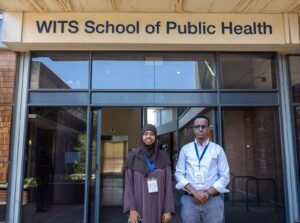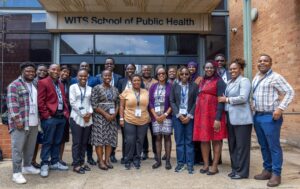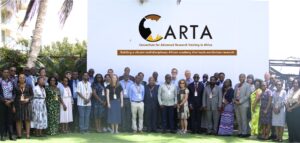In a week-long series of high-level engagements, CARTA hosted events spanning strategic leadership dialogues, a virtual convening of Vice Chancellors and Heads of Partner Institutions, and a comprehensive review of its open-access digital curricula. The events took place from May 26 to 30 at the African Population and Health Research Center (APHRC) campus in Nairobi.
Advancing Governance and Strategy
On May 26 – 27, the CARTA Board of Management (BoM) convened for a two-day engagement that featured a development workshop, a formal BoM meeting, and an intensive strategy session. The development workshop sought to enhance the governance capacities of both new and continuing board members. It was informed by recommendations from the 2024 board performance appraisal and underscores CARTA’s commitment to institutional learning and excellence in governance.
During the BoM meeting, members deliberated on key governance matters and reviewed resolutions from the recent Partners Forum that was held on April 19. The discussions are critical in steering CARTA forward as the program continues to strengthen African universities and nurture a pipeline of multidisciplinary researchers equipped to address the continent’s pressing development challenges.
The strategic planning session capped the engagement, providing a platform for the Board to engage with emerging priorities and ideas generated by CARTA stakeholders for the program’s next phase. Facilitated by the program co-Director and Executive Director of the African Population and Health Research Center, Catherine Kyobutungi, the session examined strategic cause-and-effect relationships and culminated in the drafting of initial strategy statements, laying the foundation for CARTA’s 2026 – 2030 strategy.

CARTA Board of Management meeting, Nairobi-Kenya, May 2025
Engagement with Institutional Leaders to Strengthen Research and Postgraduate Training
CARTA convened a virtual forum for Vice Chancellors and Heads of Partner Institutions to explore strategic alignment and future priorities. The biennial meeting, now in its seventh edition, was held on May 28, 2025, and provided a platform to review program performance, reflect on the evolving funding landscape, and deepen institutional engagement in strengthening postgraduate training and research ecosystems. Institutional leaders contributed to CARTA’s ongoing strategy development process, identifying tailored opportunities to enhance program impact and reaffirming their collective commitment to nurturing the next generation of African research leaders.
Optimizing the CARTA Curricula
The week concluded with a consultative workshop from May 28 – 30, to review CARTA’s curricula and develop a strategic roadmap for broader adoption and dissemination within and beyond partner institutions. The workshop brought together CARTA training coordinators and facilitators to evaluate the use, accessibility, and relevance of CARTA’s teaching resources.
Participants reviewed feedback from a targeted survey of trainer-of-trainers (ToT) beneficiaries, conducted a hands-on critique of digital content and the curricula site, and assessed materials across five key interventions. These include PhD training; ESE:0’s Academic writing; Academic, Professional and Administration Staff Workshops – APAS, also referred to as Institutional support or Research management; Graduate Grant Writing Workshop; and Supervisors Workshop. The workshop culminated in the development of detailed action plans and a structured review roadmap, which will be guided by the coordinators of each of the interventions.

Group photo-CARTA focal persons and members of the secretariat during curricula review meeting in Nairobi-Kenya, May 2025
These engagements underscored that building sustainable research capacity in Africa requires more than quality training—it calls for strong institutional leadership, collaborative strategy, and adaptable tools that support diverse academic contexts. As CARTA partners continue aligning efforts across governance, pedagogy, and institutional systems, the consortium remains firmly anchored in its vision to build and sustain a vibrant African academy capable of leading world-class, multidisciplinary research that advances public and population health.






No Comments